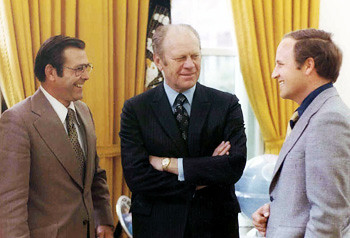
The years of the Ford Administration, from late summer 1974 through the end of the Bicentennial, lurk in my memory as cultural interstitia. A minor Midwestern limbo between "the Sixties" and "the Seventies" during which nothing appeared to happen, but powerful memes of future change were cryogenically sealed in the sub-basement with the remains of Walt Disney.
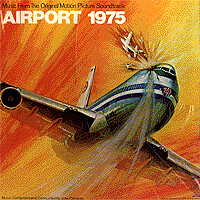
During those years, they renovated the old mall in my hometown (which had originally been built on the site of a monastery much older than the surrounding suburb) to double its size. The central feature of the new wing was a rounded bi-level courtyard anchored by such mid-70s retail landmarks as a Spencer's Gifts, a leather clothing store, a Biorhythm reading machine, a pet store specializing in hamsters, gerbils and Habitrails, a magic supply store, and a B. Dalton bookstore.
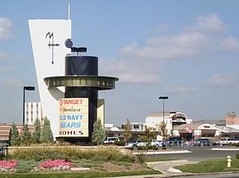
On the ground floor, the developers installed a larger-than-life bronze sculpture of a nude and anatomically correct man with a handlebar moustache riding a gigantic tricycle. No explanation was provided.
I seriously doubt such an aesthetic enigma would have been viable in any other period than the Ford Administration. After the Sixties had blown gaping holes in all of the cultural conformities of the Fifties, and before the consequent opportunities for hedonism morphed into the coked out Seventies.
In that B. Dalton, you could still find fresh how-to books of American insurrection, from The Anarchist's Cookbook to The Monkey Wrench Gang. If you were the sort of kid who frequented the science fiction shelves, amid the Bama bronzes and the Frazetta cheescake, you might discover the featured new Bantam paperback of 1975: Samuel R. Delany's Dhalgren. A Frederik Pohl selection!

The cover offered your average pre-adolescent nerd a familiar fantasy of wandering the post-apocalyptic landscape, a power meme drilled in by a steady stream of Charlton Heston cozy catastrophes. The interior was something much more, its tale of a mysterious Midwestern city cut off from the rest of civilization by an unknown catastrophe serving as the narrative vessel for an experimental novel of consciousness. The inhabitants of the book willingly linger in their meandering dystopia, wallowing in the implosion of conventional social structure. A prescient masterpiece, but not exactly mainstream commercially accessible fare. Only during the Ford Administration would such a work sell a million copies.
For me, Dhalgren tunes the existential frequency of that peculiar period as well as any other contemporary work. A crackled transmission from a mirror reality, accidentally tuned in on translator channel 72.
The dream of revolution becomes a non-sequitur, running out of gas. Enjoy the laser show and pass the spliff.
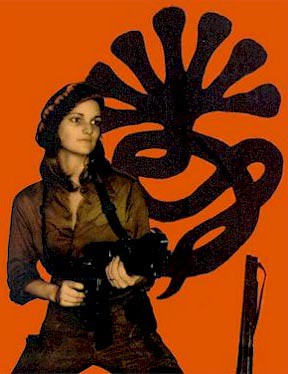
Presidential assassins become openly surreal. Only during the Ford Administration could one of Charlie [Manson]'s Angels emerge as a risible self-parody of political violence (check out RU Sirius' awesome post this week at 10 Zen Monkeys on"The Chicks Who Tried to Shoot Gerald Ford").
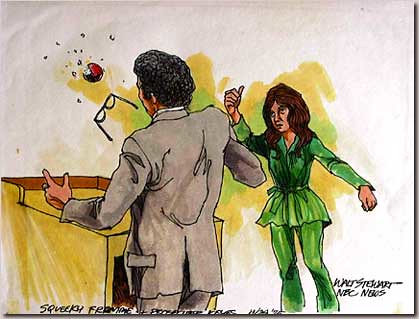
Urban legends trump real news in the aftermath of Nixon and the War. Rumors abound, spread by boys as their neighborhood matinee houses are repurposed as grindhouse pornos. The secret post-history of the cast of Leave it to Beaver: Wally was a cop, Eddie Haskell was Alice Cooper, and the Beav got fragged in Nam.
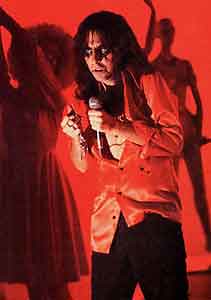
Somebody's dad's friend who worked at the hospital told astonishing tales of the midnight emergency room visit of a famous rock star when he played his recent show at Veteran's Auditorium (see Number 6). Put your finger on the turntable and turn it counterclockwise for the real story.

The 20th century utopian dream of radical change was definitively snuffed by the masterful anti-climax of President Ford's primary executive act, the anthems of the earnest replaced with self-amused irony stoned on pop culture junk food.
At my elementary school, designed on an experimental open plan, we buried a Bicentennial time capsule. Therein, we hermetically sealed a variety of artifacts of the end of the jet age, the clandestine history of that eighteen-month epoch backmasked onto forgotten vinyl LPs in the voices of children possessed by the frequency modulated spirits of the cathode ray, the sound of an Emergency Broadcast System test played backwards. The capsule is not to be opened until 2076, but on some days it seems the secrets are already seeping out, deep sleeper culture agents lurking among us, awaiting activation orders from headquarters.
2 comments:
all true, of course. That's around when I read "Dahlgren" -- though the sex in the book seemed to mimic some of what was in the air in the left coast alternative school I was at (rather, the sex everyone else seemed to be having -- ain't it always so?)
"The Monkey Wrench Gang" came later, in the 80's, but did lead to my first arrest(s)!
And I was already armed with a precociously -obtained police press pass on the day Patty Hearst was kidnapped... right down the street...
What I really want to know is what your secret SLA name was, the one you used for your undercover infilitration of the group. The years of the Ford Administration also being notable, of course, for the post-Woodstein investigative journalism fad. You are the Cinque of the subconscious, the Jack Anderson of semiotics, the meta-Geraldo who excavates the Capone vaults behind our foreheads.
Post a Comment